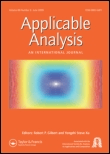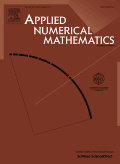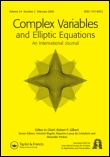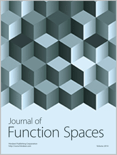
Fractional Calculus and Applied Analysis
Scope & Guideline
Navigating the Complexities of Mathematics with Precision
Introduction
Aims and Scopes
- Fractional Differential Equations:
The journal emphasizes the study of fractional differential equations, exploring their existence, uniqueness, and properties. This includes both linear and non-linear equations, and their applications in various fields such as physics, engineering, and finance. - Numerical Methods and Approximations:
There is a strong focus on the development and analysis of numerical methods for solving fractional differential equations. This includes collocation methods, finite difference methods, and other computational techniques that enhance the accuracy and efficiency of solving these equations. - Applications in Various Fields:
The journal covers a wide range of applications of fractional calculus in fields such as physics, biology, finance, and engineering. This includes modeling phenomena that exhibit memory and hereditary properties, which are better represented using fractional derivatives. - Theoretical Developments:
Theoretical advancements in fractional calculus, including new definitions, properties, and frameworks, are a core area of interest. This also encompasses the exploration of fractional operators, inequalities, and stability analysis. - Interdisciplinary Approaches:
The journal encourages interdisciplinary research that combines fractional calculus with other mathematical fields, such as stochastic processes, control theory, and optimization, highlighting the versatility and applicability of fractional calculus.
Trending and Emerging
- Fractional Stochastic Analysis:
There is an increasing focus on fractional stochastic differential equations and their applications in finance and physics. This trend highlights the importance of incorporating randomness and uncertainty into fractional models. - Complex Systems and Nonlinear Dynamics:
Research on fractional calculus applied to complex systems and nonlinear dynamics is gaining traction. This includes studies on chaos, bifurcations, and control of nonlinear fractional systems, showcasing the applicability of fractional calculus in real-world complex phenomena. - Interdisciplinary Applications:
Emerging themes include interdisciplinary applications of fractional calculus in fields such as epidemiology, economics, and environmental science. This trend reflects the growing recognition of the utility of fractional models in addressing complex problems across various disciplines. - Advanced Numerical Techniques:
There is a notable trend towards the development of advanced numerical techniques for fractional differential equations, including adaptive methods and machine learning approaches. This reflects a demand for more efficient and accurate computational tools. - Fractional Control Theory:
The application of fractional calculus in control theory, particularly in the design and analysis of fractional-order controllers, is increasingly popular. Researchers are exploring the benefits of fractional control strategies in enhancing system performance and stability.
Declining or Waning
- Basic Theoretical Studies:
There seems to be a waning interest in purely theoretical studies of fractional calculus without direct applications. Researchers are increasingly seeking practical applications and numerical methods rather than solely focusing on theoretical frameworks. - Static Models:
The frequency of publications focusing on static models of fractional calculus is decreasing. This shift may indicate a broader interest in dynamic systems and time-dependent models that incorporate memory effects. - Simple Fractional Operators:
Research on basic fractional operators, such as the Riemann-Liouville and Caputo derivatives, is becoming less frequent. Instead, there is a trend towards more complex and generalized fractional operators that account for various boundary conditions and nonlocal effects.
Similar Journals

Punjab University Journal of Mathematics
Connecting researchers to elevate the field of mathematics.Punjab University Journal of Mathematics is a prestigious academic journal published by the Department of Mathematics at the University of Punjab, Pakistan. Dedicated to advancing the field of mathematics, this journal provides a platform for researchers, educators, and students to disseminate their findings, foster scholarly dialogue, and promote innovative mathematical research. With a strong focus on theoretical and applied mathematics, the journal maintains a rigorous peer-review process to ensure high-quality publications that significantly contribute to the mathematical community. Although currently not indexed in prominent databases, the journal aims to elevate its visibility and impact through consistent publication of cutting-edge research. The absence of Open Access reflects a commitment to quality and thorough review, but researchers are encouraged to seek out this valuable resource for its insights and diverse contributions to mathematics.

APPLICABLE ANALYSIS
Elevating the discourse in applied mathematics.APPLICABLE ANALYSIS, published by Taylor & Francis Ltd, is an esteemed journal dedicated to advancing research in the fields of analysis and applied mathematics. With its ISSN 0003-6811 and E-ISSN 1563-504X, the journal has been a cornerstone of scholarly communication since its inception in 1971, with a convergence of content projected until 2024. Belonging to the Q2 category for both Analysis and Applied Mathematics as of 2023, it ranks impressively at #58 out of 193 in the field of Mathematics Analysis and #274 out of 635 in Mathematics Applied Mathematics as per Scopus metrics. Although the journal currently does not offer Open Access, it continues to provide valuable insights and cutting-edge research that is vital for academics, professionals, and students who seek to deepen their understanding and application of analytical techniques in various contexts. Its commitment to high-quality research plays a significant role in shaping the landscape of modern mathematics.

Evolution Equations and Control Theory
Driving Innovation through Rigorous Mathematical Insights.Evolution Equations and Control Theory is a prestigious academic journal published by the Amer Institute Mathematical Sciences (AIMS), focusing on the intersection of applied mathematics, control theory, and simulation models. With a commendable track record since its inception in 2012, the journal has quickly established itself as a leading resource for researchers and practitioners in the fields of applied mathematics and control systems, as evidenced by its Q1 ranking in multiple categories for 2023. The journal features rigorous peer-reviewed articles that explore significant theoretical advancements and practical applications in evolution equations and their control. Although it operates under a subscription model, the high impact of research published in this journal, including its Scopus rankings—placing it within the top percentiles in related disciplines—makes it an essential read for those advancing knowledge in this vital area of study. Based in the United States, the journal continues to foster global academic discourse, driving innovation and development in evolving mathematical frameworks.

Applied Mathematics in Science and Engineering
Transforming Ideas into Solutions with Applied Mathematics.Applied Mathematics in Science and Engineering is a prestigious academic journal published by TAYLOR & FRANCIS LTD, dedicated to presenting innovative research at the intersection of applied mathematics, science, and engineering disciplines. Since its inception as an Open Access platform in 2022, this journal has empowered researchers worldwide to disseminate their findings without barriers, enhancing knowledge-sharing among scholars, professionals, and students. Covering a wide range of topics, including but not limited to mathematical modeling, computational methods, and engineering applications, Applied Mathematics in Science and Engineering aims to foster interdisciplinary collaboration and advance the field through high-quality research articles. With a commitment to rigorous peer review and academic excellence, this journal serves as an essential resource for anyone seeking to stay at the forefront of applied mathematics in contemporary scientific inquiry.

Applied Numerical Mathematics
Advancing the Frontier of Numerical Analysis.Applied Numerical Mathematics is a prestigious journal published by Elsevier, focused on advancing the field of numerical analysis through rigorous research and innovative methodologies. With an impressive impact factor and a solid reputation, this journal occupies a leading position in the academic community, as evidenced by its Q1 rankings in Applied Mathematics, Computational Mathematics, and Numerical Analysis for 2023. This status makes it an essential resource for researchers and professionals eager to stay at the forefront of numerical techniques and applications. Covering a broad range of topics from algorithms to theoretical developments, the journal invites submissions that contribute to the theoretical and practical advancements in numerical methods. Its convergence over the years, beginning in 1985 and extending through 2025, signifies its enduring relevance and commitment to addressing contemporary scientific challenges. Despite its traditional publication model, researchers can access the journal's rich content through various institutional subscriptions, facilitating the dissemination of knowledge across the globe.

Complex Variables and Elliptic Equations
Exploring the Depths of Mathematical InterplayComplex Variables and Elliptic Equations is a distinguished academic journal published by TAYLOR & FRANCIS LTD, focused on the intricate interplay between complex variables and elliptic equations. With an ISSN of 1747-6933 and an E-ISSN of 1747-6941, this journal serves as a vital platform for researchers and practitioners in the fields of Analysis, Applied Mathematics, Computational Mathematics, and Numerical Analysis. With a publishing history spanning from 2007 to 2024, the journal is recognized for its substantial contributions, as evidenced by its Q2 ranking in Applied Mathematics and Numerical Analysis, and Q3 in Analysis and Computational Mathematics for 2023. Notably, it occupies various Scopus ranks that reflect its ongoing academic relevance—ranked #86 in Mathematics Analysis and #49 in Numerical Analysis. While it does not currently operate under an open-access model, the journal remains an indispensable resource for advancing mathematical theory and its practical applications. Researchers, students, and professionals alike will find invaluable insights and developments that push the boundaries of mathematical inquiry.

Fractal and Fractional
Advancing Knowledge in Fractal and Fractional DynamicsFractal and Fractional is a prestigious open access journal published by MDPI since 2017, dedicated to advancing the study of fractals and fractional calculus, crucial fields that bridge mathematics, physics, and engineering. With an E-ISSN of 2504-3110 and based in Switzerland, this journal serves as a vital platform for disseminating cutting-edge research and innovative applications. As of 2023, it holds an impressive Q2 quartile ranking in multiple categories including Analysis, Statistical and Nonlinear Physics, and Statistics and Probability, placing it among the top tier of academic publications. Researchers will find valuable insights into contemporary issues within its scope, supported by robust metrics such as Scopus rankings which highlight its significant impact in the fields of Mathematics and Physics. Since its inception, Fractal and Fractional has garnered a reputation for quality and accessibility, making it an essential resource for academics and practitioners engaged in the exploration of complex systems and mathematical phenomena.

Advances in Differential Equations and Control Processes
Advancing Knowledge in Differential Equations and ControlAdvances in Differential Equations and Control Processes, published by PUSHPA PUBLISHING HOUSE, is a leading journal dedicated to the exploration and advancement of differential equations and control processes, critical areas of study within applied mathematics and engineering. With its ISSN 0974-3243, this journal offers a platform for researchers, practitioners, and students to publish and disseminate innovative findings, methodologies, and applications. Although currently not listed as open access, the journal invites submissions that contribute to the theoretical and practical aspects of differential equations, showcasing significant advancements in both fields. By fostering a rigorous peer-review process, it aims to maintain high standards of publication quality, thus holding a vital place in the academic landscape. The journal also serves as a valuable resource for those interested in the intersection of mathematics, physics, and engineering, encouraging collaboration and dialogue among scholars across disciplines. Discover the latest research and developments that drive the future of differential equations by exploring the rich content this journal has to offer.

Computational Methods for Differential Equations
Unlocking New Frontiers in Differential Equation ResearchComputational Methods for Differential Equations is a prominent academic journal dedicated to the exploration and application of computational techniques in the realm of differential equations. Published by UNIV TABRIZ, this open-access journal has been providing unrestricted access to groundbreaking research since 2013, making it a valuable resource for the global academic community, particularly in Iran. It has carved out a niche within the fields of Algebra and Number Theory, Applied Mathematics, and Numerical Analysis, maintaining a Q3 quartile ranking in 2023 across these categories. Researchers, professionals, and students alike will find the journal's commitment to disseminating innovative computational methodologies essential for advancing knowledge and developing robust solutions to complex mathematical problems. With its ISSN 2345-3982 and E-ISSN 2383-2533, the journal ensures wide visibility and accessibility, serving a diverse audience and promoting scholarly discourse.

Journal of Function Spaces
Navigating the Frontiers of Function SpacesWelcome to the Journal of Function Spaces, an esteemed publication dedicated to advancing the field of mathematical analysis with a specific focus on function spaces. Published by HINDAWI LTD since 2003, this open access journal benefits from an extensive global readership, enabling researchers, professionals, and students to freely share and access influential research. With an impressive Scopus rank of #16 out of 193 in the Mathematics - Analysis category, and positioned in the Q3 quartile, the journal confirms its status as a valuable resource within the academic community. The journal fosters high-quality research aimed at elucidating various aspects of function spaces, thus contributing significantly to the theories and applications foundational in modern analysis. With its headquarters in London, England, it embraces innovation and accessibility, aiming to facilitate a collaborative environment for scholars to disseminate their work effectively. We invite you to explore the latest findings and contribute to the enriching discourse within this essential domain.